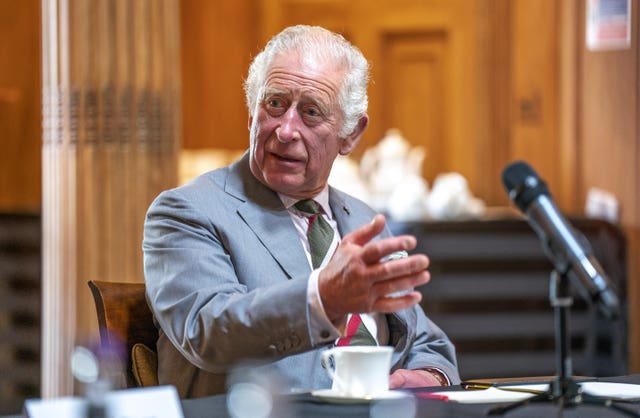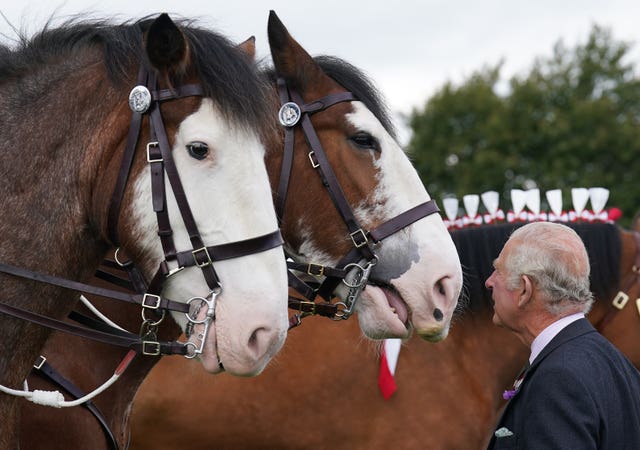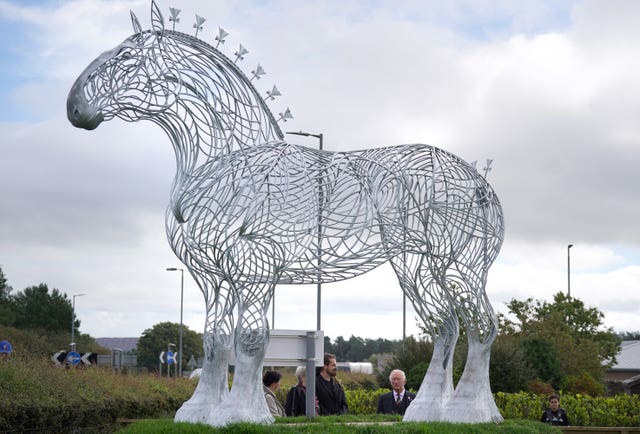
The Prince of Wales has pledged a partnership with leading allergists at a conference organised by two parents whose teenager died following a severe allergic reaction.
Nadim and Tanya Ednan-Laperouse’s 15-year-old daughter Natasha died after eating a Pret sandwich before boarding a plane to France in 2016.
Since then, they set up the Natasha Allergy Research Foundation to campaign to eradicate allergies.
The charity organised a two-day Global Allergy Symposium at Dumfries House in Cumnock this week which saw 16 world-leading allergy experts from the UK, US, Finland, Germany, Hong Kong and Denmark discuss environmental factors such as biodiversity loss and climate change that are known to be major risk factors for emerging allergies.

Charles joined the conference on Wednesday and pledged a partnership between his Prince’s Foundation, which champions sustainable living, and Natasha’s parents’ campaign to eradicate allergies.
He has said he was “moved beyond words” by her death and the way her parents have “selflessly dedicated themselves to preventing other families suffering in the same way”.
Addressing the room, Charles said: “Would there be any added value to having a partnership with what you’re trying to do, my Foundation and your efforts on allergies, because it fits with so many things I’ve tried to do and the messages I want to get across.”
During the conference, he spoke about “going organic” and “making the polluters pay” to address some of the environmental factors that can contribute to emerging allergies.
In response to his offer, Natasha’s parents said Charles’s support was a “game-changer”.
Speaking after the announcement, they said: “We are absolutely thrilled that His Royal Highness has pledged the support of his Prince’s Foundation to tackle the allergy epidemic.
“It will be a game-changer for the one-in-three people in this country with an allergy.
“We were deeply moved by his personal interest in what is driving the allergy epidemic and how he can help us take steps to turn the tide.”
Professor James Gern, attending the conference, spoke about his role looking at early life environment factors associated with wheezing illnesses, particularly those caused by respiratory viruses.
He told the room about the importance of exposure to animals at a young age as a protective measure.
“In suburban homes, we find that exposure to a dog is one of the most important protective factors if it starts about the time of birth,” he said.
“In farming studies, it shows the more animal contact in early life or during the prenatal period really benefits the child.”

The idea of bringing the world’s leading allergy and environment experts together was first raised by Charles, who is known as The Duke of Rothesay when in Scotland, following the 2018 inquest into Natasha’s death which highlighted the growing allergic epidemic, particularly among children and young people.
The baguette she ate had sesame seeds baked into the dough, to which Natasha was severely allergic, however the label did not mention this ingredient.
Before the conference, Charles visited the Lanark Community Development Trust outside the Lanark Auction Market to pet some Clydesdale horses as he helped commemorate the breed’s recent tricentenary.
The Trust had hoped to install a sculpture honouring Clydesdale horses in time for the 300th anniversary of the breed in 2020, but the project was delayed by the pandemic.
It was finally unveiled this summer.
Charles was greeted by Lady Susan Haughey, Lord Lieutenant of Lanarkshire, and Sylvia Russell, chairwoman of Lanark Community Development Trust, and met sculptor Dan Adams, who told him how he had created the artwork.
A number of Clydesdale horses, including two police horses, were in the field beside the sculpture and the prince stroked some of them as he chatted to the people looking after them.
Mrs Russell said the trust was “delighted” that the prince, who has been patron of The Clydesdale Horse Society since 2007, had paid them a visit.
She said: “It was wonderful to meet the prince. We were thrilled he decided to come and visit. He was very interested in everything.”

Sculptor Mr Adams, from the Cod Steaks model-making company in Bristol, said he enjoyed meeting Charles.
“It was an honour,” he said. “He is a lovely chap.”
Earlier in the day, Charles visited New Lanark, a purpose-built mill village created by David Dale and Robert Owen in the 18th century. It became a model for industrial communities that was to spread across the world in the 19th and 20th centuries.
Charles viewed a display of industrial artefacts and was also expected to see giant steam engines and the huge main textile room where the preserved looms are still in operation, producing textiles for commercial use.


Comments: Our rules
We want our comments to be a lively and valuable part of our community - a place where readers can debate and engage with the most important local issues. The ability to comment on our stories is a privilege, not a right, however, and that privilege may be withdrawn if it is abused or misused.
Please report any comments that break our rules.
Read the rules here